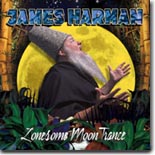
James Harman
Lonesome Moon Trance
Pacific Blues
Recording Co.
 James Harman is no stranger to making great records.
Extra Napkins, Takin’
Chances and Cards On The Table have carved his legacy deep into the
“modern
West Coast” sound for not only being a great harp player and singer, but
for
having an impeccable eye for talent. James Harman is no stranger to making great records.
Extra Napkins, Takin’
Chances and Cards On The Table have carved his legacy deep into the
“modern
West Coast” sound for not only being a great harp player and singer, but
for
having an impeccable eye for talent.
That legacy continues with the
release of
Lonesome Moon Trance (Pacific Blues Recording Co.) a spectacular album
packed with
a superstar lineup that reads like a who’s who of the Southern California
blues scene, most of whom have been members of Harman’s band at some point
in
time.
James states in the liner notes that he does not record albums, but
rather
songs, and custom fits the players to each tune rather than using one band,
as
each player brings their own special gift to each number.
Full Moon Trance
is a
completely original endeavor of 12 numbers that are rich in not only
musical
content but social conscious and political awareness as well, then executed
with the panache and vitality that James brings to all his recordings.
The
opening “Double Hogback Growler” asserts what type of party this is going
to be,
with Harman growling out his distinctive vocals and blasting out a few
slick
harp runs, alongside Kid Ramos’ stinging solos and Tom Mahon’s flight-fingered
piano, for a fun romp to get your blood circulating. The problems of
today’s
world, along with its lack of morality and one man's refusal to
participate in it,
gets close inspection on “Low Down Grown-up Jive,” a funky workout that
features the pulsing piano work of Carl ‘Sonny’ Leland and the guitar
wizardry of
rising star Kirk ‘Eli’ Fletcher.
The album’s only instrumental, “Skeet-a
little-Taste,” has the multi-talented Jeff Turmes playing “tortured”
guitar and
upright bass, along with Al West on drums and Harman bending out some
grisly
notes.
“Piecework Politician” proposes the notion of having politicians’
paychecks reflect the work they have done. We should all only live so long
to
witness this idea, presented as a mid-tempo number, highlighted by
the
rhythm section of Rick ‘Brother Miles’ Reed plunking the bass and new
Mighty
Flyer drummer Paul Fasulo adding some silky brushwork. The Paladins’ David
Gonzalez trades some nasty guitar licks with Robert Eason on the strutting
bop of
“Alibi, Reason Why,” which may strike a nerve in all chronic liars of the
heart.
A bit of lamentful slow blues is in store for you on “Miss Bessie Mae
Blues,” and is dedicated to not only James’ departed dog (yes his dog) but
also the
piano player on this number, Tom Mahon, who is delicately brilliant. This
number also features a rare listen to Kid Ramos playing acoustic. Stephen
Hodges’
thundering drum work is at the forefront of “My Secret Escapde,” and Bob
Margolin contributes some slippery slide to the slow drag of “Bad Luck
Life,” a
tune that is quickly becoming a personal favorite with its story of having
more
trouble than luck and whose point is solidly cemented by Harman’s drawling
vocals.
The ragtime-ish stomp of “Love Stuff” is a terrific jam that
boogies
and grooves with fabulous solos by Harman, Sonny Leland and Kirk Fletcher,
and is
easily the hottest number on the album. Harman struts his harp chops to
the
fullest on the backward shuffling “Time Will Tell,” and receives optimal
accompaniment by one of the industry’s best kept secrets on the 88s, Mr.
Steve
F’dor. It’s a complete toss up as to whose solo will make your ears bleed
first,
James’ harp or Junior Watson’s fierce guitar, exploding throughout “It’s Yo’ World (I’m Just Living In It).”
The title tune wraps things up, and I’m
going to leave the listeners to discover it for themselves.
Besides great
performances and content, this album is a complete pleasure to the ears,
with a crisp,
clean sound that deserves a big thumbs up to its co-producers, the man
whose
name is on the marquee, and Jerry Hall. I don’t think there has ever been a
James Harman album that the two of them have not collaborated on. The
professional respect they share comes through on every project, but this
one in
particular is pure musical art.
If you haven’t gotten your hands on this
timeless
masterwork yet, I highly recommend you do so. Pop on a pair of
headphones, crank
up the volume, prop your feet up and just remember as you listen that:”Evah
thang gonna be alright, afterwhile!”
If James Harman should happen to ever read
this review, I would personally like to say, “Thank You Baby” for a
monumental piece of work.
--- Steve Hinrichsen |


![]()